SUMMARY
This is AI generated summarization, which may have errors. For context, always refer to the full article.

MANILA, Philippines – The House of Representatives enters the new year with renewed desire to get the ball rolling on charter change discussions.
The lower chamber’s constitutional amendments panel – which only convened for the first time under the Marcos administration in December 2022 – is eyeing to conduct a series of hearings beginning January 26 to delve into the bills referred to it.
Eight House lawmakers – most of them holding key posts – have submitted a total of nine proposals. They are:
- Deputy Speaker Aurelio “Dong” Gonzales (Pampanga 3rd District)
- Deputy Majority Leader Lorenz Defensor (Iloilo 3rd District)
- House constitutional amendments panel chairman Rufus Rodriguez (Cagayan 2nd District)
- House energy panel chairman Lord Allan Velasco (Marinduque)
- House human rights panel chairman Benny Abante (Manila 6th District)
- House legislative franchises panel chairperson Gus Tambunting (Parañaque 2nd District)
- House veteran affairs panel chairman Patrol Representative Jorge Bustos (Patrol)
- LRay Villafuerte (Camarines Sur 2nd District)
A deeper look at the bills they filed unveils differences in the path they want to take to revise the 1987 Constitution, as well as the specific amendments they want to introduce.
Constitutional convention or constituent assembly?
The existing charter states that any amendments to it may be proposed either by Congress, upon a vote of 75% of all its members, or a constitutional convention.
Out of the nine bills, five proposed the constituent assembly route. Gonzales has argued that this process – wherein both chambers meet to raise amendments – is more cost-efficient.
Rodriguez, Abante, and Villafuerte, meanwhile, want a constitutional convention, wherein delegates elected from every legislative district will come together to submit a proposal.
Rodriguez said the constitutional convention route would ward off criticisms that proposed political amendments to the charter reek of self-interest, since legislators will not be the one making such suggestions under this scenario.
Specifically, Rodriguez’s proposal sets the last Monday of October 2023 as the date of the election of delegates, simultaneous with the barangay elections being organized by the Commission on Elections.

Term extension
A perennial controversy when it comes to charter change discussions is the proposal to alter the term limits imposed on elective officials.
Gonzales’ bill touches on term extension, proposing that the president and vice president be given a five-year term upon being elected, and be given the option to run for a one-time reelection. This means that a popular president could stay in Malacañang for 10 years.
He also wants elective local officials to get a a five-year term, and the opportunity to serve for at most two consecutive terms.
Gonzales’ argument is that House lawmakers, for example, are hampered from doing gargantuan tasks due to their “very short” three-year term, a chunk of which, he said, is spent on administrative matters, budget deliberations, and preparing for their reelection bids.
Being voted in tandem
Part of the bill that Gonzales filed included a provision that says a vote for the president shall also be a vote for the vice president who belongs to the same political party.
Tambunting, who made a similar suggestion in one of the two charter change-related bills he filed, argued that tandem voting would enhance national unity and avoid situations wherein the elected president and vice president come from different political parties.
The country’s top leaders – President Ferdinand Marcos Jr. and Vice President Sara Duterte – ran as a tandem, but before their historic win, the last time that the Philippines elected a president and vice president from the same political alliance was in 2004.
Expanding the presidential line of succession
If the president dies, resigns, becomes incapacitated, or is removed from office, the Constitution states that the vice president could succeed them, followed by the Senate president, and the House speaker.
If all of these officials are unable to assume the top seat of power, the charter authorizes Congress to craft legislation that would provide for the manner of selecting a new acting president.
Bustos’ bill is not exactly an effort to amend the Constitution, but he nonetheless wants to put in place an expanded presidential line of succession, which includes the most senior senator, and the most senior House lawmaker.
He also suggested a designated survivor-like system, wherein a Cabinet member designated by the president must be sequestered in a secret location, should those in the presidential line of succession come together for an event or function. In the extraordinary scenario that they all die or be permanently disabled, that Cabinet member will be acting president.
Judicial reform
Defensor, meanwhile, suggested that the president be stripped of the power to directly appoint members of the Supreme Court.
Instead, he wants the president to submit a list of at least three nominees to the chief justice, after which incumbent members of the High Court will choose who they want their next colleague to be.
Economic amendments
Tambunting and former House speaker Velasco, meanwhile, are pushing to include the phrase “unless provided by law” in various economic provisions of the 1987 Constitution.
“In order to fully transform this economic growth into inclusive and solidary progress among Filipinos, the restrictive economic provisions in the Philippine constitution which hamper the flow of foreign capital investments must be lifted,” Velasco’s proposal read.

Outlook
It remains to be seen whether efforts to amend the Constitution would pick up steam this time.
Marcos’ predecessor, former president Rodrigo Duterte, was a staunch advocate of federalism, but even his earnest efforts fell short in fulfilling his campaign promise to revise the decades-old charter.
Charter change is not among the top priorities of the Marcos administration, based on the list of pet bills enumerated during his first State of the Nation Address (SONA), and by the Legislative-Executive Development Advisory Council.
House Speaker Martin Romualdez, whose bills he himself authored often swiftly hurdled his chamber, has yet to put his name on any charter change-related measure.
The upper chamber’s enthusiasm towards charter change also hangs in the air. Senator Robinhood Padilla, who chairs the constitutional amendments panel, filed a bill last year seeking a review of the Constitution for possible revision. No substantial update has come about from that so far. – Rappler.com
Add a comment
How does this make you feel?






There are no comments yet. Add your comment to start the conversation.